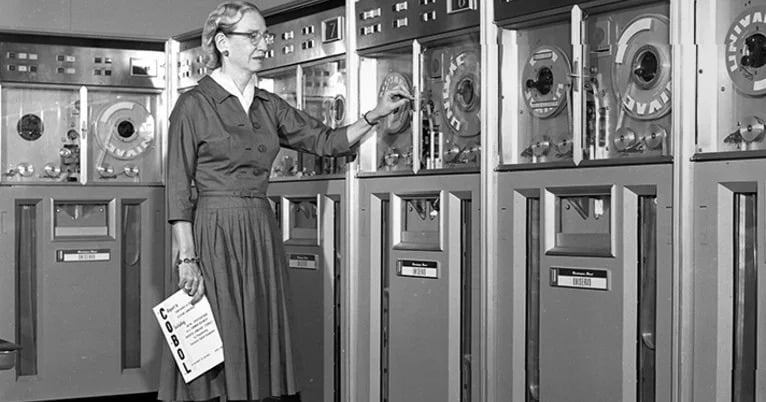Top 11 Most Influential Women In Tech History

Throughout history, women have made significant contributions to the field of technology. Here are a few of the most influential women in tech history.
Ada Lovelace (1815-1852) is considered the first computer programmer. She is known for her work on the Analytical Engine, a proposed early computer. Lovelace developed a system for translating mathematical formulas into machine instructions, which is considered to be the first computer program.
Grace Hopper (1906-1992) was a computer scientist and United States Navy rear admiral. She is credited with developing the first compiler, a tool that translates programming languages into machine code. Hopper also played a key role in the development of the COBOL programming language.
Hedy Lamarr (1914-2000) was an Austrian-American actress and inventor. She is best known for her work on spread spectrum technology, which is the basis for modern Wi-Fi and Bluetooth. Lamarr’s invention was originally developed as a way to prevent enemy forces from jamming radio-controlled torpedoes during World War II.
Annie Easley (1933-2011) was an African-American mathematician and computer programmer. She worked at NASA for 34 years, where she contributed to the development of the Space Shuttle program and other space missions. Easley was one of the first African-American women to work as a computer programmer at NASA.
Mary Wilkes (1913-2004) was an American computer programmer and logic designer. She is best known for her work on the LINC computer, which is considered to be the first personal computer. Wilkes also wrote the first operating system for a personal computer.
Adele Goldberg (born 1945) is an American computer scientist and pioneer in computing. She is best known for her work on the Smalltalk programming language, which was used to develop the graphical user interface (GUI) for the Apple Macintosh computer. Goldberg is also the co-founder of Parc, a research center at Xerox that was responsible for many important innovations in computing.
Radia Perlman (born 1931) is an American computer scientist and network engineer. She is known as the “Mother of the Internet” for her work on the Spanning Tree Protocol (STP) and other protocols that are essential for the operation of the Internet. Perlman is also the co-inventor of the Ethernet bridge, a device that connects different Ethernet networks together.
Katherine Johnson (1918-2020) was an American mathematician and physicist. She worked at NASA for 35 years, where she calculated the trajectories of spacecraft, including the Apollo missions. Johnson’s calculations were critical to the success of the space program.
Karen Sparck-Jones (1942-2007) was a British computer scientist and information scientist. She is best known for her work on natural language processing and information retrieval. Sparck-Jones is considered to be one of the founders of the field of information retrieval.
Elizabeth Feinler (1938-2003) was an American computer scientist and information scientist. She is best known for her work on information retrieval and search engines. Feinler is considered to be one of the inventors of the modern search engine.
These are just a few of the many women who have made significant contributions to the field of technology. Their work has helped to shape the modern world and continues to inspire new generations of women to pursue careers in technology.
Who was the first woman in tech?
Ada Lovelace (1815-1852) is widely recognized as the first computer programmer. She was the daughter of Lord Byron and a brilliant mathematician who translated Charles Babbage’s work on the Analytical Engine, a proposed early computer, into English. In her notes, Lovelace went beyond translation and described how the Analytical Engine could be used to perform a variety of calculations, including musical compositions and graphics. This work is considered to be the first instance of computer programming.
Lovelace’s contributions to technology were not widely recognized until the 1950s, when her notes were rediscovered by B.V. Bowden. Bowden published her work in a book called “Faster Than Thought: A Symposium on Digital Computing Machines,” which helped to bring Lovelace’s contributions to light. Today, Lovelace is considered a pioneer in the field of computer science and is celebrated annually on Ada Lovelace Day, which is held on the second Tuesday of October.
Here are some of Ada Lovelace’s significant contributions to technology:
- She recognized the potential of computers to perform a wide range of tasks beyond mere calculations.
- She developed a system for representing numbers in binary form, which is the basis of modern computing.
- She described how computers could be used to perform logical operations, which is essential for programming.
Lovelace’s work was groundbreaking and laid the foundation for the development of modern computing. She is an inspiration to women in technology around the world.
Who is a US woman in tech that inspires you and why?
There are many inspiring women in tech in the United States, but one who stands out to me is Kimberly Bryant, the founder and CEO of Black Girls Code. Bryant is an entrepreneur, educator, and advocate who is dedicated to closing the gender and racial gap in technology. Through her work with Black Girls Code, she has introduced thousands of young girls of color to the world of computer science, empowering them to become the innovators and leaders of tomorrow.
Bryant’s story is one of resilience and determination. Growing up in a low-income neighborhood in South Florida, she didn’t have access to the same resources and opportunities as many of her peers. However, she was always fascinated by technology, and she never gave up on her dream of working in the field. After graduating from college, she worked her way up the corporate ladder, eventually becoming an executive at a Fortune 500 company.
But Bryant wasn’t satisfied with simply making it for herself. She wanted to help other girls from underprivileged backgrounds achieve their dreams. In 2011, she founded Black Girls Code, a non-profit organization that provides after-school programming workshops to young girls of color. The organization has since grown to serve over 10,000 students in over 40 cities across the United States.
Bryant’s work has been recognized by numerous organizations, including the United Nations, the White House, and Forbes magazine. She is a passionate advocate for diversity and inclusion in the tech industry, and she is committed to making sure that all girls have the opportunity to learn about and pursue careers in technology.
I am inspired by Kimberly Bryant because she is a role model for girls of all backgrounds. She shows us that it is possible to overcome obstacles and achieve our dreams. She is also a powerful voice for change, and she is helping to make the tech industry a more inclusive and equitable place.
Who are the most influential women of our time?
Michelle Obama: As the First Lady of the United States from 2009 to 2017, Michelle Obama became a global icon for her advocacy for education, healthy living, and women’s empowerment. She is also the author of the bestselling memoir “Becoming.”
Malala Yousafzai: Malala Yousafzai is a Pakistani activist for female education and the youngest Nobel Prize laureate. She was shot in the head by the Taliban for advocating for girls’ education in her home country. She survived the attack and went on to found the Malala Fund, which helps girls around the world go to school.
Angela Merkel: Angela Merkel is the Chancellor of Germany and the longest-serving head of state in the European Union. She is a powerful figure in world politics and has been praised for her leadership during the eurozone crisis and the refugee crisis.
Oprah Winfrey: Oprah Winfrey is an American talk show host, actress, producer, and philanthropist. She is best known for her talk show “The Oprah Winfrey Show,” which was the highest-rated television program of its kind in history. She is also the founder of the Oprah Winfrey Network and the Oprah Winfrey Foundation.
Emma Watson: Emma Watson is a British actress and activist. She is best known for her role as Hermione Granger in the “Harry Potter” films. She is also a UN Women Goodwill Ambassador and has advocated for gender equality and women’s rights.
These are just a few of the many influential women of our time. These women are making a difference in the world and inspiring others to do the same.
Who is known as mother of computer?
Ada Lovelace, born Augusta Ada King, Countess of Lovelace, is widely recognized as the “mother of computers” for her groundbreaking work on Charles Babbage’s Analytical Engine, a proposed mechanical general-purpose computer. Her contributions to the field of computer science include:
Recognizing the Potential of Computers Beyond Calculations: Lovelace’s most significant contribution was her ability to envision the potential of computers beyond mere numerical calculations. She recognized that computers could be used for a wide range of tasks, including music composition, art, and even language translation.
ALSO READ: Sand Dollar (Bahamas) Digital Currency: A Beginner’s Guide
Developing the First Algorithm: Lovelace is credited with developing the first algorithm specifically designed for a computer. She translated and annotated Babbage’s work on the Analytical Engine, adding her own insights and observations. In doing so, she outlined a step-by-step process for performing a specific mathematical operation using the machine.
Understanding the Concept of Programming: Lovelace grasped the fundamental concept of programming, recognizing that computers could be instructed to perform complex tasks by following a series of instructions. This insight paved the way for the development of modern programming languages.
Advocating for the Future of Computing: Lovelace was a passionate advocate for the potential of computers to revolutionize society. She saw them as tools that could improve education, science, and even the arts. Her writings and lectures helped to generate interest in computing and influenced future generations of computer scientists.
Ada Lovelace’s contributions to the field of computer science were groundbreaking and visionary. She laid the foundation for modern computing concepts such as programming, algorithms, and the potential of computers beyond numerical calculations. Her legacy continues to inspire and shape the field of computer science today.
Which girl was invented a computer?
Ada Lovelace, born Augusta Ada King in London, England, on December 10, 1815, is considered the world’s first computer programmer. She is best known for her work on Charles Babbage’s Analytical Engine, a proposed general-purpose mechanical computer that was never built. In 1843, Lovelace translated an Italian article about the Analytical Engine and appended her own notes, which included a description of how the machine could be used to perform a variety of mathematical operations. These notes are considered the first computer program.
Lovelace’s work was groundbreaking because she recognized the potential of computers to go beyond simple calculations and to perform more complex tasks, such as manipulating symbols and data. She also foresaw the potential for computers to be used in a variety of fields, including science, engineering, and business.
Lovelace’s work on the Analytical Engine was not widely known until the late 1970s, when her notes were rediscovered. She is now considered one of the most important pioneers in the history of computing.
Who is the father of technology?
Thomas Edison is widely considered the “father of technology” due to his prolific inventions and significant contributions to the field. He held a record-breaking 1,093 patents, including the phonograph, the lightbulb, and the motion picture camera. His inventions had a profound impact on society, transforming everyday life and paving the way for modern technological advancements.
Edison’s approach to invention was characterized by a methodical and systematic process. He established the world’s first industrial research laboratory, which served as a hub for innovation and collaboration. This pioneering approach to research and development set a precedent for future inventors and helped to accelerate technological progress.
ALSO READ: Crypto Pepes: What Does The Frog Meme?
While Edison is often credited as the “father of technology,” it is important to acknowledge the contributions of countless other individuals who have shaped the field. Technology is a collaborative endeavor, and Edison’s work stands as a testament to the power of human ingenuity and the transformative potential of innovation.
Why C is called mother of all languages?
C is often referred to as the “mother of all programming languages” due to its profound influence on the development of many other programming languages. This title is attributed to several factors that have made C a foundational language in the realm of programming:
Pioneering Role: C, developed by Dennis Ritchie in the 1970s, was one of the first high-level programming languages to provide direct access to hardware and low-level system functions. This flexibility enabled programmers to create efficient and powerful applications, making C a popular choice for system programming.
Widespread Adoption: C’s influence extends far beyond system programming. Its versatility and efficiency have led to its widespread adoption in various domains, including operating system development, embedded systems, and game programming.
Influence on Syntax and Concepts: C’s syntax and core concepts, such as data types, control flow structures, and pointers, have shaped the design of many modern programming languages. Languages like C++, Java, C#, Python, and JavaScript all share similarities with C’s syntax and fundamental concepts.
Foundational for Compilers and Virtual Machines: C is often used as the language of choice for developing compilers and virtual machines for other programming languages. This further solidifies its role as a foundational language in the programming landscape.
Teaching Language: C is frequently taught as an introductory programming language due to its relatively simple syntax and emphasis on low-level programming concepts. This educational role helps introduce new generations of programmers to the fundamentals of programming, further perpetuating C’s influence.
In summary, C’s legacy extends beyond its own functionality. It has laid the groundwork for countless programming languages and continues to shape the way we think about and approach software development. Its influence is undeniable, earning it the well-deserved title of “mother of all programming languages.”
In Conclusion:
C’s impact on the world of programming cannot be overstated. Its simplicity, efficiency, and versatility have made it a cornerstone of modern software development. From its humble beginnings as a language for system programming, C has evolved to become the foundation for numerous programming languages and frameworks. Its legacy lives on in the countless applications and systems that have been built using its principles. As we continue to push the boundaries of technology, it is clear that C will remain a vital part of the programming landscape for years to come. Whether you’re a seasoned developer or just starting out.







